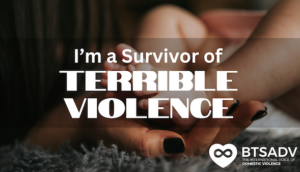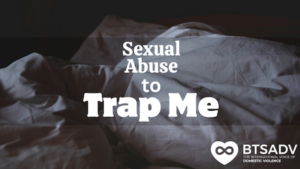
By Jenn Rockefeller
The aftermath of an abusive relationship is complicated. From figuring out living situations to financial solutions, our lives can become unmanageable. When you add our emotional well-being into the mix, well, that just compounds the aftermath into a tension-filled life. When we deal with reliving the same events and emotions over and over in our minds, it can immobilize us and cause us great fear. This post-traumatic stress can turn our lives into living nightmares.
What is post-traumatic stress and how can we treat it?
Definition
Post-traumatic stress disorder (PTSD) is a disorder that manifests in those who have experienced or witnessed a terrifying or traumatic event. According to the American Psychiatric Association, PTSD affects about 3.5 percent of adults in the United States, with an estimated one in 11 people receiving a diagnosis.
Treatments
There are two main categories for PTSD treatments–psychotherapy (also called “talk therapy”) and pharmacological. Both can have positive outcomes for the patient, so discuss with your service provider to see what option is best for you.
- Cognitive Behavior Therapy (CBT): CBT is a trauma-focused therapy that centers on identifying and understanding the trauma and how to change behavior patterns. For more information on CBT, you can visit the Mayo Clinic or the Psych Central websites.
- Eye Movement Desensitization and Reprocessing (EMDR): EMDR helps lessen the effects of PTSD by invoking a particular distressing memory while also focusing on an external stimulus. You can learn more about EMDR in a previous BTSADV article here or by visiting the EMDR Institute website.
- Prolonged Exposure Therapy (PET): PET focuses on gradually approaching trauma-related memories and feelings. For more information on PET, you can visit the American Psychological Association and the U.S. Department of Veteran Affairs websites.
- Stress Inoculation Training (SIT): Sit is another form of cognitive behavior therapy that exposes you to milder forms of stress to help you better cope with additional stressors when they pop up. For more information on SIT, you can visit Mental Help or Very Well Mind.
- Present Centered Therapy (PCT): PCT doesn’t directly deal with the trauma, but rather centers on present-day issues. It includes ways to cope with current life stressors. To learn more about PCT, you can check out this article published on the Cochrane Library website.
- Pharmacological: Many therapists and psychiatrists may recommend medications for those enduring the effects of PTSD. There are specific medications that will help lessen the invasive and unwanted thoughts, hypervigilance, avoidance and raw emotions related to the trauma you experienced. Talk with your therapist to discuss if pharmacological therapy is right for you.
Finding a service provider
There are several ways to search for a service provider, depending on the exact type of therapy you may need or want.
- American Psychological Association: You can search by location, specialty, and insurance accepted.
- Association for Behavioral and Cognitive Therapies: Narrow your search to those who specialize in cognitive or behavioral therapy.
- EMDR: A search provided by Psychology Today.
- EMDR International: If you live outside the United States, this is a great tool to search for an EMDR certified therapist in your country.
- Anxiety and Depression Association of America: Search by city, state or zip code.
- International Society for the Study of Trauma and Dissociation: Locate a provider who specializes in treating trauma. Search by city, zip code or accepted insurance plans.
If you or someone you know is in an abusive relationship, there is help. You can visit the Break the Silence website at www.breakthesilencedv.org or chat with one of our helpline advocates at 855-287-1777.









